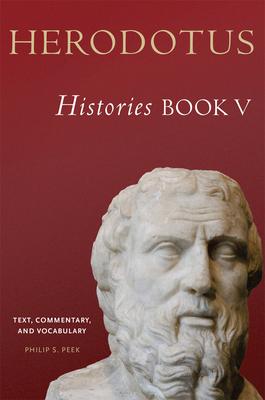History begins with Herodotus (485-425 b.c.e.). Born in Halikarnassos, a gateway between the Greek and Persian worlds, Herodotus in his Histories narrates the great historical struggle between the Persian Empire and the Greek-speaking city-states at the dawn of the classical era. Herodotus does not merely list events or tell tales; his history inquires into the causes of events and casts its net wide to include ethnography and legend as well as political and military history.
Book V of the Histories focuses on the Persians and their expansion into Thrakia and Makedonia, as well as their conflict with the Greeks of Ionia. Beginning in the timeless legends of prehistory, Herodotus discusses the customs of the Thrakians, offers insight into Sparta's mindset, and narrates the struggle to restore democracy at Athens after the reign of the tyrant Peisistratos.
The narrative of Book V sprawls over Asia, Africa, and Europe, naming more than 350 people and places. The reader will find in Herodotus a literate, keenly observant, wide-ranging guide to a time when Persia ruled 40 percent of the world's population and was confronted by an uneasy and fragile alliance of Greek city-states.
In his introduction to the text and commentary, Philip S. Peek outlines a process by which students of ancient Greek can develop translation and reading skills. For students' convenience, Peek pairs the Greek text with the commentary and includes in the book's appendices a case and function chart, an explanation of infinitives, a summary of the subjunctive and optative moods, a list of parsing terms, and a list of the five hundred most commonly occurring Greek words. A comprehensive glossary rounds out the volume. As further aids to students, running vocabulary for each text section and a generalized list of the principal parts of verbs can be downloaded from oupress.com.

Herodotus, Histories, Book V: Text, Commentary, and Vocabulary
History begins with Herodotus (485-425 b.c.e.). Born in Halikarnassos, a gateway between the Greek and Persian worlds, Herodotus in his Histories narrates the great historical struggle between the Persian Empire and the Greek-speaking city-states at the dawn of the classical era. Herodotus does not merely list events or tell tales; his history inquires into the causes of events and casts its net wide to include ethnography and legend as well as political and military history.
Book V of the Histories focuses on the Persians and their expansion into Thrakia and Makedonia, as well as their conflict with the Greeks of Ionia. Beginning in the timeless legends of prehistory, Herodotus discusses the customs of the Thrakians, offers insight into Sparta's mindset, and narrates the struggle to restore democracy at Athens after the reign of the tyrant Peisistratos.
The narrative of Book V sprawls over Asia, Africa, and Europe, naming more than 350 people and places. The reader will find in Herodotus a literate, keenly observant, wide-ranging guide to a time when Persia ruled 40 percent of the world's population and was confronted by an uneasy and fragile alliance of Greek city-states.
In his introduction to the text and commentary, Philip S. Peek outlines a process by which students of ancient Greek can develop translation and reading skills. For students' convenience, Peek pairs the Greek text with the commentary and includes in the book's appendices a case and function chart, an explanation of infinitives, a summary of the subjunctive and optative moods, a list of parsing terms, and a list of the five hundred most commonly occurring Greek words. A comprehensive glossary rounds out the volume. As further aids to students, running vocabulary for each text section and a generalized list of the principal parts of verbs can be downloaded from oupress.com.